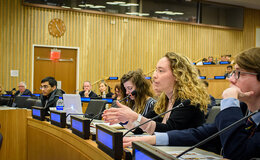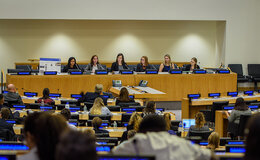On April 20, Veronica McKinny ’18 spoke from a podium at the United Nations headquarters in New York City. McKinny gave the opening remarks at the Students Seeking Solutions for the SDGs conference, a project she had been working on for two years.
The conference featured undergraduate scientists with proposals for one of the UN’s Sustainable Development Goals, SDG 6: ensure availability and sustainable management of water and sanitation for all.
A number of students submitted proposals, and a panel of judges from academia, industry and the UN selected proposals to be presented at the conference, McKinny said. Four individuals and one team presented, from universities including Penn State and Columbia.
McKinny said one of her favorite proposals was from Penn State’s team, who created a water filter using a Moringa seed. The trees grow easily in areas with low water, making it a doable solution for a community, as long as the technique is there, McKinny said.
A team from Hunterdon Central Regional High School also submitted a poster presentation and sent 30 students to observe the conference. The presence of the high schools students was energizing, said Jordan Davis ’20 a conference co-organizer.
“It inspires the younger and up and coming college students to put themselves out there and research what they’re interested in,” Davis said.
Davis said it was also inspiring to see the tangible progress being made by undergraduate college students.
“South Africa is pretty much running out of water right now so the crisis is a lot worse than a lot people think it is,” Davis said. “We hear a lot of talk and no action, but this conference was actually research and action that students, who are not even out of college yet, have created and worked for years on to try to find a solution.”
Davis served as the Lehigh-UN Partnership Intern throughout the fall 2017. Though her tenure as the partnership intern ended, Davis remained on the team to help plan the conference.
At first, her role was just to provide support. Davis said she researched and contacted different groups, but as the conference approached, her role grew. She began to handle logistics and communications with those speaking and presenting at the conference.
On the day of the event, Davis moderated one panel of student presenters and introduced the afternoon keynote speaker, Elliot Harris, the Assistant Secretary-General for Economic Development and Chief Economist in the UN Department of Economic and Social Affairs.
Besides serving as one of the keynote speakers, Harris had an integral hand in developing the conference.

Realizing a Goal to Connect Young Scientists with the UN
When McKinny first became a UN Youth Representative for the American Association of University Women in spring 2016, she noticed a dearth of scientists, and scientific discourse, at the United Nations.
On the bus ride back to Lehigh from New York, McKinny discussed her observations with Bill Hunter, director of the Lehigh University-United Nations Partnership. She told Hunter she wanted to see more scientists involved in the UN.
“One of the reasons why I wanted this conference to happen was I would be sitting at the UN and people would be presenting how the world is now and how they want the world to be, but there wasn't any how do we get there,” McKinny said. “That wasn't a part of the discussion and a lot of times I would say okay, I see this happing through science, but there weren't any scientists in the room.”
Hunter challenged McKinny to create a project, or conference, that would get undergraduate scientists involved with the UN from a young age.
“From that conversation with (Hunter), we decided that would be something that we were both interested in pursuing,” McKinny said.
After years of submitting proposals, in November 2017, McKinny and Hunter met with Harris. At the time, he served as the Assistant Secretary-General and Head of the New York Office of the United Nations Environment Programme.
After hearing McKinny’s idea, Harris decided it was an idea the UN would get behind. He wanted her to organize the program at the UN headquarters in New York.
“So two years of sending proposals out into the void, and finally it happened,” McKinny said.

A Student Idea Grows into Something “UN-Worthy”
McKinny and Hunter had previously planned to host the program at Lehigh, so the switch to hosting the program at the UN headquarters was significant.
It was originally supposed to be a smaller project or conference, said Jessica Williams, a conference co-organizer and Lehigh graduate student.
“To go from a university conference to something that’s held at the United Nations, we were all putting in a lot of work to make this a UN-worthy project and I think it was successful and we really did that,” Williams said. “We made it a UN-worthy conference.”
Williams said the event went extremely well, better than they had even hoped, because they had been prepared for all different outcomes.
“I really would like to see this blossom into something that happens each year,” Williams said. “I’d like to see all of the SDGs covered, you know each year a new SDG.”
Victoria McCulley ’19 served as the Lehigh-United Nations Partnership Intern this semester and also helped to co-organize the conference. She said there are 17 Sustainable Development Goals and she would like to see solutions for the other 16 approached in this way.
McCulley said she would love to be a part of the planning process for another conference, but she thinks that it is most important to provide the opportunity for more people to get involved. She said she thinks as years go on the conference itself will get bigger, with more student applications, more UN officials and more of a global presence.
“I think we’re going to see even more diversity as the years go on,” McCulley said. “I think we’re going to see it grow.”
McKinny also hopes there are more conferences that tackle solutions for the SDGs and bring more young scientists into the discussions.
“If a young scientist gets to present at the UN, or gets to go the UN early in their career, they’re more likely to be involved in that discussion as they grow into their career,” McKinny said.
After all, the conference was all about the students. McKinny said that while there were adult expert panels—a necessary and extremely helpful part of the conference—the day was focused on the undergraduates and their work.
McKinny and her team actually changed the schedule on the day of the conference to incorporate more time for the student proposal presentations.
“It’s so easy to get bogged down in the expert speaker side of things that you lose sight of what this conference really is,” McKinny said. “It’s a conference for students by students and that was one of the things that made it as powerful as it was.”
